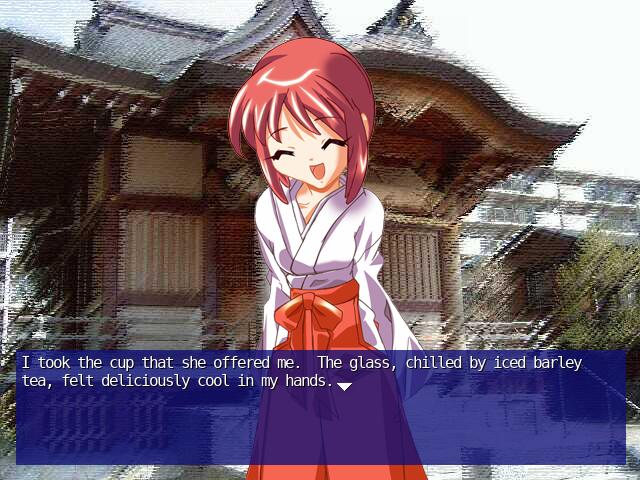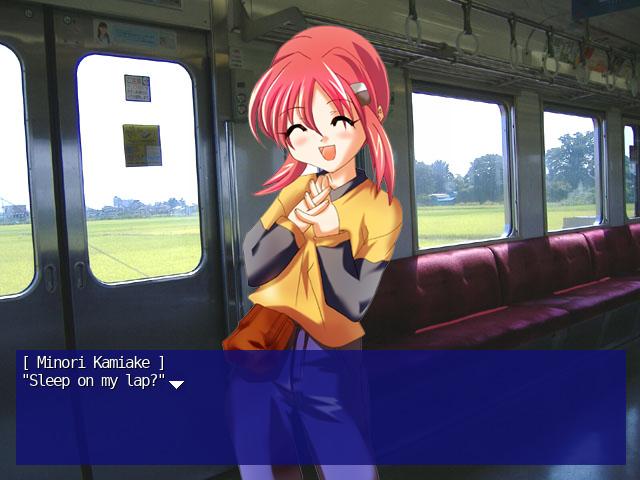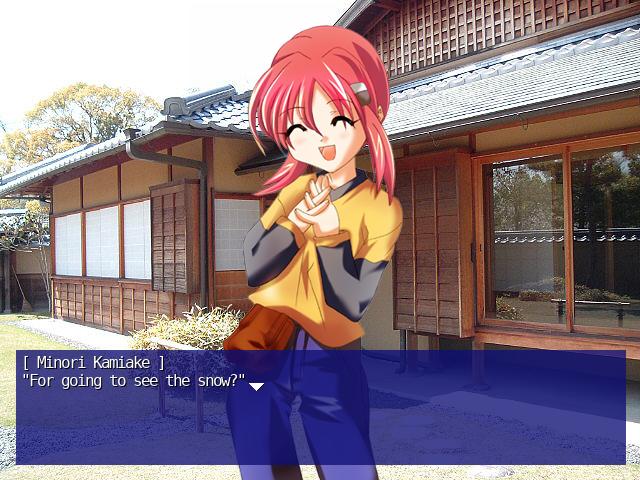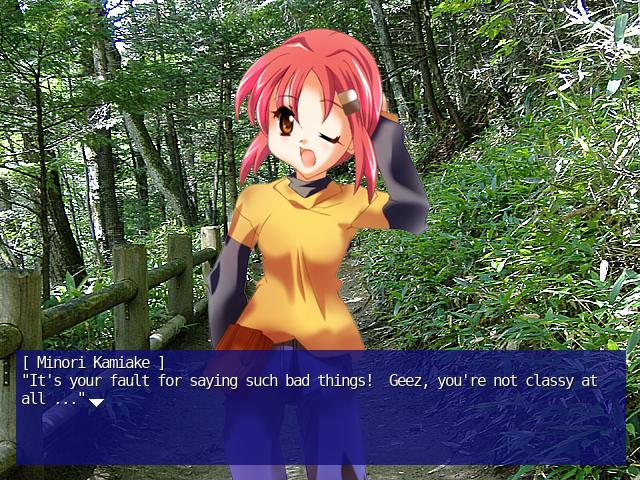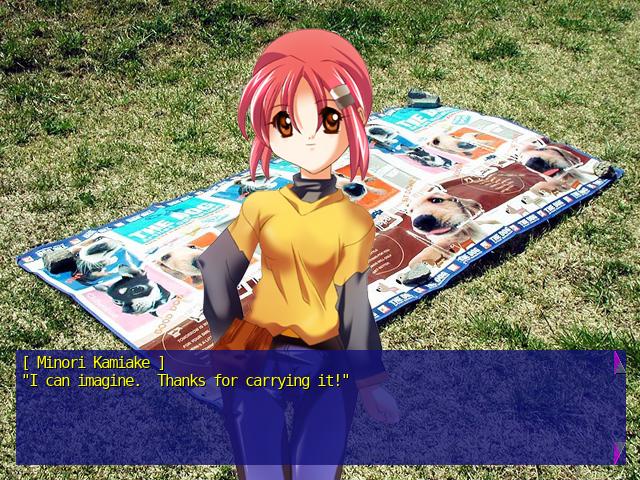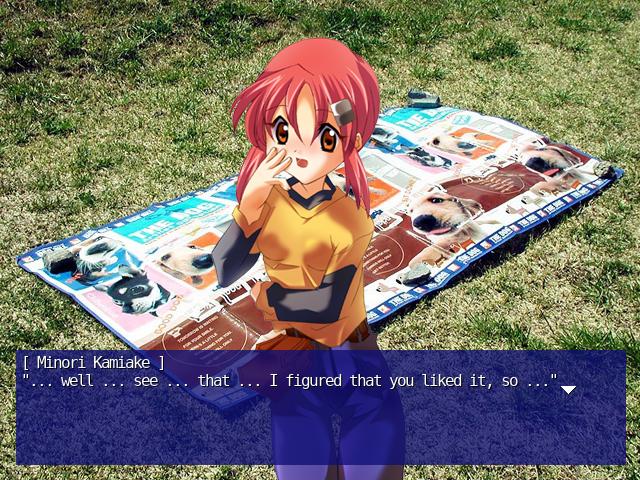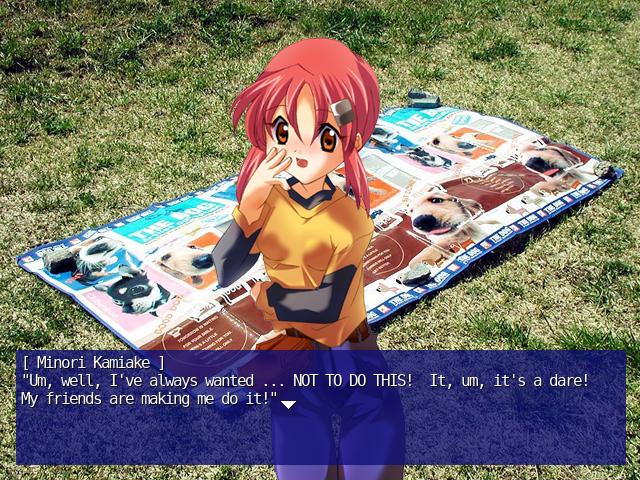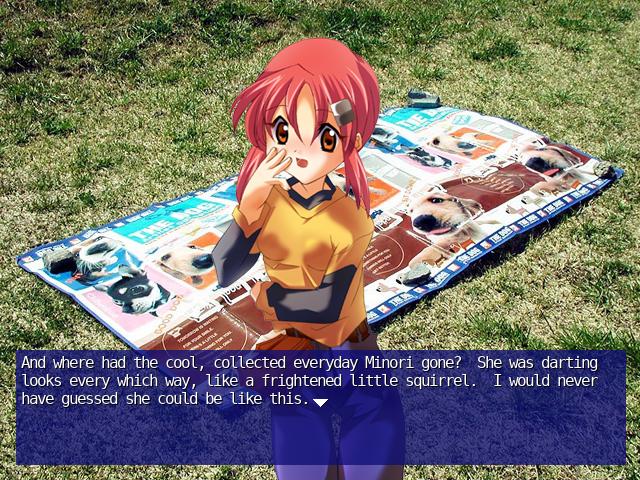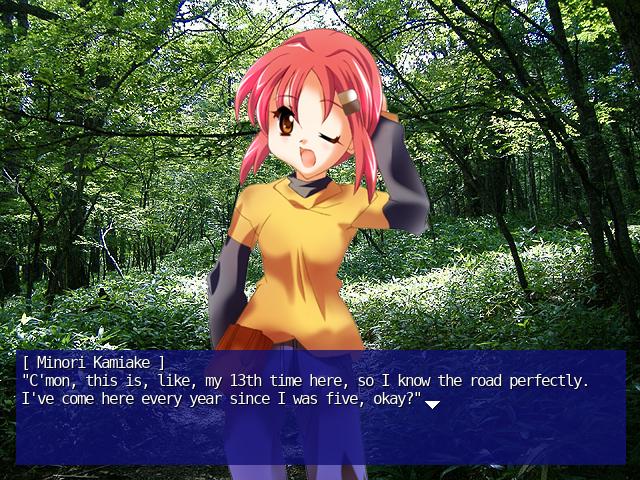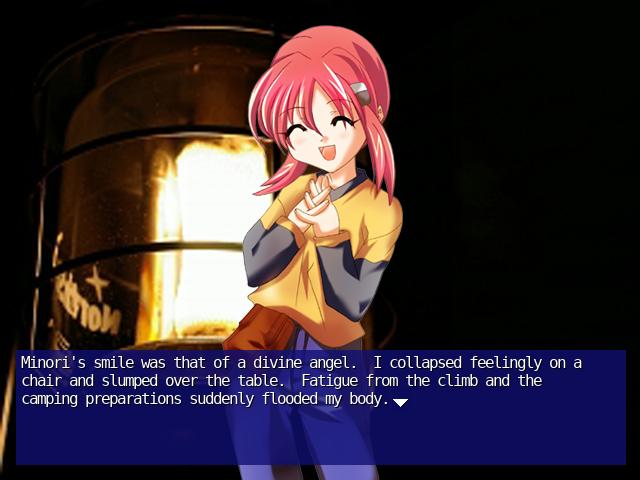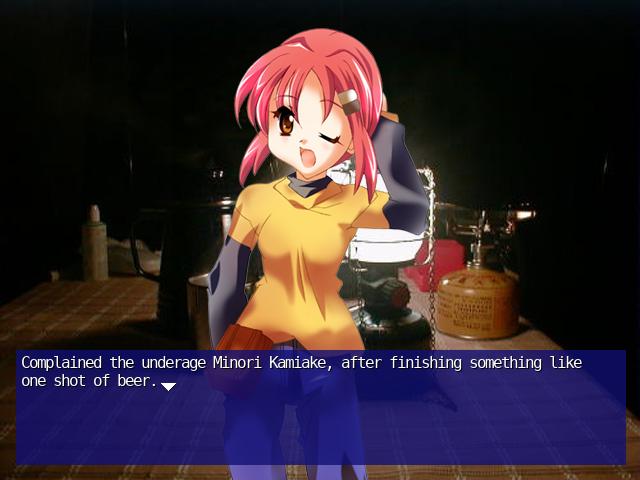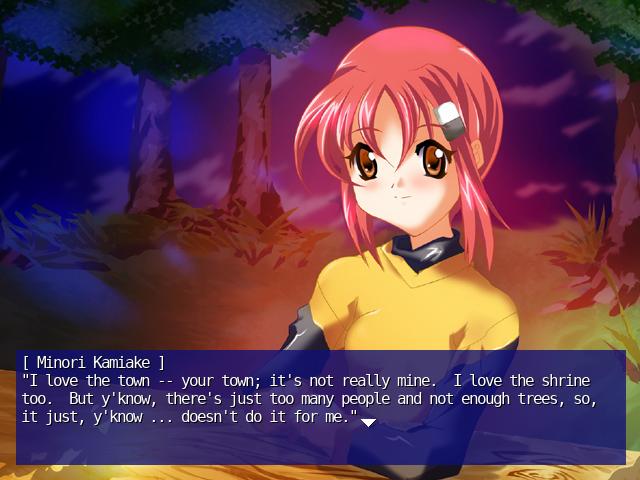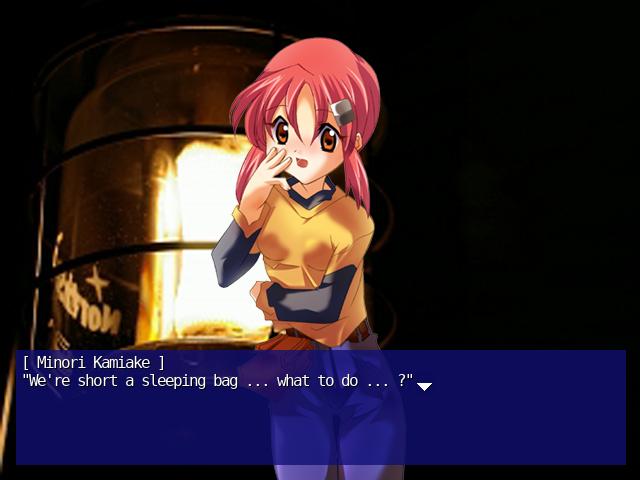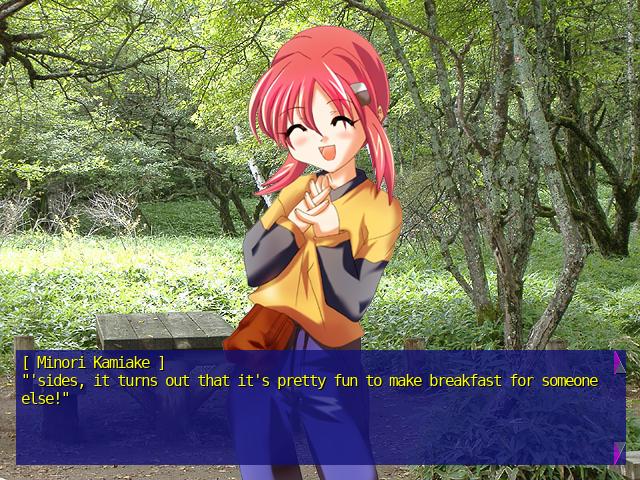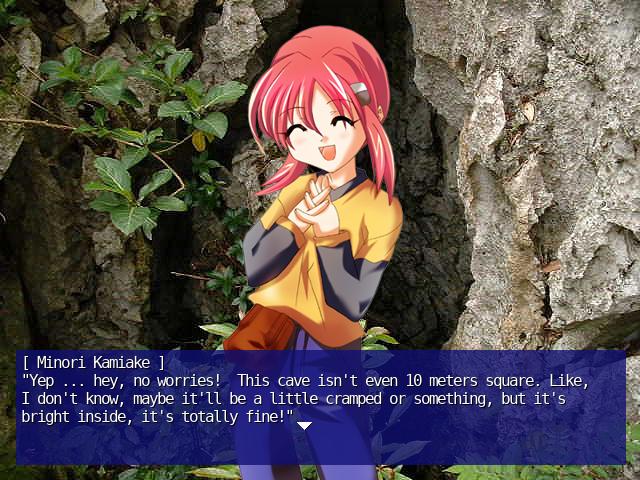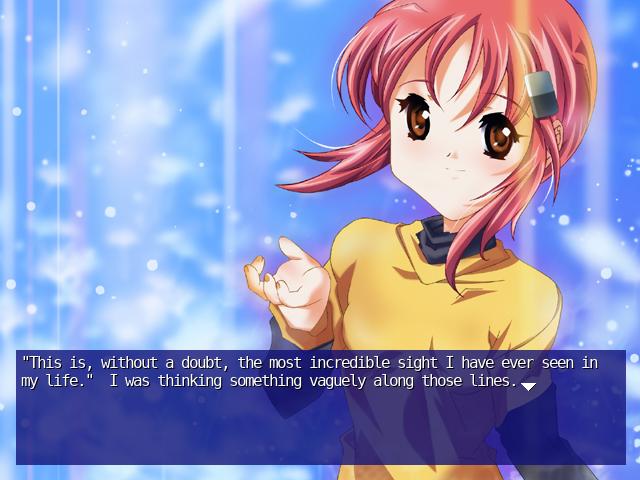This is part three of my four part series analyzing May Sky, the 2008 official English language localization of an impressive 2005 freeware Japanese visual novel called Gogatsu no Sora. This article covers the in-game period transpiring in August, 15 months after the May in the main game (and almost certainly August of 2006). Everything in this article presupposes you have read parts one, two, and three of my project and, ideally, my spoiler-free review of May Sky (I recommend starting with the review if you are not familiar with May Sky).
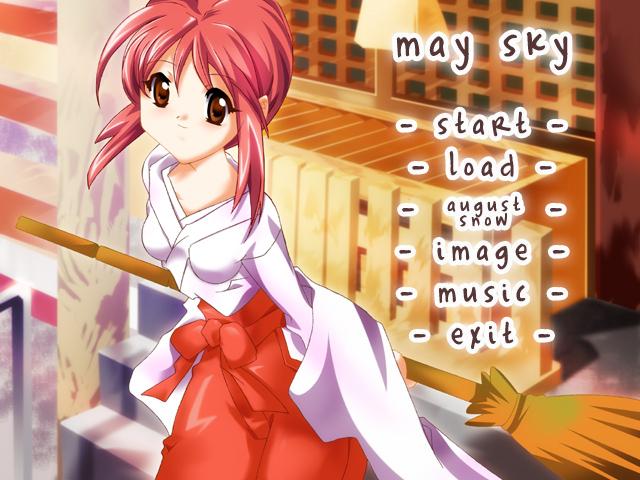
With that brief introduction out of the way, I pick up where I left off in part 3 of this series.
Note on Quotes
There are no itallics in May Sky. For ensuring clarity, I am using itallics in quoation blocks when the block includes a character’s (always Haruki’s in this analysis piece) internal monologue. I am doing this to distinguish the internal monologue quotes from spoken quotes. These rules do not apply to the final section of this article when I am quoting Ms. Irene Ying, the lead English translator for the novel.
August 20, 2006
(See my evidence for August Snow being set in 2006.)
We pick up the story in August, 15 months after the initial May chapter. Haruki and Minori are again hanging out at the shrine like they had before they became a couple after more than a year apart.
Minori then sprang a question on Haruki: Would he be free that weekend? When Haruki confirmed that he would be free, Minori offered an invitation:
… wanna go and see some snow?
Minori Kamiake
Haruki was understandably confused in light of the fact it was August. (Unlike one half of Ef – a fairy tale of two, this novel does not take place in Australia.)
August 26, 2006
But he evidently agreed, and we jump ahead to the morning of Saturday, August 26, with Haruki and Minori on a train to a destination known only to Minori. Haruki was at a loss, but he tried to guess where they were going based on Minori’s attire:
Today she had exchanged her shrine maiden robes for what looked like a rough hiking outfit. Thick cloth, long sleeves. Probably because we were headed somewhere chilly.
Haruki Mizoguchi
Haruki, still being Haruki, decided to go to sleep when he realized they had a long train ride ahead of them. Minori, still being Minori, was a little bit annoyed. But instead of detaching Haruki’s nose from his face or whacking him with a broom, she suggested a compromise more befitting of their current relationship:
Oh, and … you know what would make me happy? Sleep on my lap?
Minori Kamiake
One hour later, Haruki and Minori arrived at their destination in the countryside. They were greeted at the station by Minori’s grandparents. Recalling the state of their relationship in May of the previous year, this is a significant moment. Back then, Minori had told Haruki that she felt like she could talk to him because he existed in a place in her life apart from family and friends. We learned that Minori had told her friends about Haruki during their year apart. Now, Minori is, sua sponte, introducing Haruki to her grandparents. Haruki had no forewarning about this, but he observed:
They also had, apparently, NO SURPRISE WHATSOEVER about the weirdo that Minori had dragged along with her.
Haruki Mizoguchi
Minori’s grandfather revealed why when he introduced himself to Haruki:
Nice to meet you. I understand that you have been taking good care of my granddaughter.
Grandfather Karose
Minori had already told her grandparents about her relationship with Haruki. In a small way, this signalled that Minori had accepted Haruki as a central part of her life.
They arrived at Minori’s grandparents’ estate in the country. (Haruki did not comment on the fact that early in their friendship he had mistakenly assumed that she came from a poor family.). Minori still had not told Haruki what they were doing or where they would see snow, but Haruki started to have ideas when he saw Minori’s grandmother packing a backpack while he and Minori relaxed and ate watermelon. Haruki was concerned that they would be hiking up a snowy mountain, but Minori insisted that the preparations were just for a picnic. Minori’s grandparents then drove Haruki and Minori to the “Oodose Mountain Range – Trail Entrance – 4.5 km to peak.”
They got out of the car where Haruki’s and Minori’s hike would apparently begin. Minori’s grandfather was surprised to learn that Minori had not told Haruki what, precisely, they would be doing:
HAHAHAHAHA! Yes, interesting, INTERESTING INDEED! That’s pretty brave of you, Haruki, agreeing to come all the way out here without any information.
Grandfather Karose
Haruki was more confused than ever. Minori ensured that her Grandfather did not reveal the nature of the “snow,” but allowed her grandfather to explain to Haruki that Minori was taking him on a hike that would carry over into the next day. Before the hike began, both Minori and Haruki had an additional notable interaction with Minori’s grandfather. First, Minori asked her grandfather to not tell her mother about her hiking trip because she had not told her mother about Haruki. Her grandfather was surprised, but apparently considered this hilarious and agreed. Minori’s grandfather then pulled a terrified Haruki aside and asked him what was it he enjoyed about Minori. We do not know the answer.
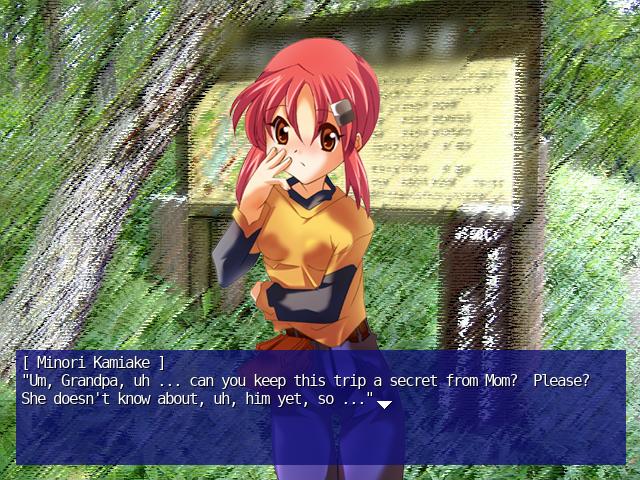
Haruki and Minori began their climb. Haruki admitted being “a little annoyed that my bag was, like, five times the size of hers,” especially when he wondered whether he was actually stronger than his petite girlfriend. Some things never change, and as always, Haruki “bore with the sheer inequality of it.”
Haruki observed that Minori seemed genuinely happy and carefree. Minori then put her feelings into words:
Mmmmmm! Aren’t mountains the greatest? Don’t you feel like your soul’s being cleansed?
Minori Kamiake
Lest anyone was worried that too much had changed, Haruki told Minori she sounded like an old man and Minori responded by elbowing Haruki in the stomach. After Haruki complained about Minori’s violence, Minori complained about his lack of class.
Fine, so maybe after today I’ll turn overnight into a man that would die at any unrefined notion …
Haruki Mizoguchi
Minori did not have much hope.
Minori returned to good cheer and began pointing out the names of all the flowers to Haruki when he admitted that he was not much of a botanist. Minori revealed that she had regularly climbed this mountain with her grandfather when she was a kid. She showed some mock exasperation when a hungry Haruki asked which plants he could eat.
Haruki, not being in as good shape as Minori, began to drag. Minori had mercy on him after a good amount of walking and chose a location for them to stop and have a picnic.
Haruki took a moment to take things in, as he explained in his narration:
From so high up, I did have a commanding view in every direction. I could see the horizon where the mountains kept on going, then met the sky. I couldn’t help but feel a sense of awe.
Haruki Mizoguchi
Minori had prepared lunchboxes for her and Haruki, and they more than met Haruki’s expectations. In part 1 of my analysis, I briefly referenced an early Haruki-Minori debate over Haruki’s love of canned tuna. Minori considered canned tuna blasphemous and not long thereafter made a point of using Haruki’s money to buy the two ingredients necessary to cook his least favorite dish. The picnic subtly revealed how their dynamic had changed. Haruki was stunned to find in his lunch box:
… tuna? Not as in, what Minori considers to be the most blasphemous of foods? CANNED tuna?
Haruki Mizoguchi
Minori confirmed that she had used canned tuna in his lunch box, despite still finding it “offensive.” Here reasoning:
… well … see … that … I figured you liked it, so …
Minori Kamiake
Given their difficult food history, Haruki was genuinely touched by Minori’s gesture, earning a “dummy” when she noticed him blushing.
Here, the novel cleverly turned two comedic incidents early in the game into an opportunity to show how Haruki’s and Minori’s relationship had changed. Minori went against what she said previously to do something nice for Haruki, and Haruki was openly and genuinely appreciative of her gesture.
Later in their lunch, Minori tried to feed Haruki chicken with chopsticks, first saying she had always wanted to do that before deviating from the script she had been given and admitting it was a dare from her friends. Here we have another important milestone for Minori. Her first substantive reference to her friends on May 15 of the previous year had her proudly admitting that she feigned sympathy with their problems and had no interest in them. That philosophy had likely led to the vague fight she had with a friend a few days later, which she confided to Haruki on May 21. That may 21, Minori also asserted that she did not tell her friends the things she told Haruki – including embarrassing things. But then, Minori revealed that in their year apart she had told her friends about Haruki. Now, Minori was accepting dares from her friends regarding Haruki – matters which certainly fall within the ambit of embarrassing. This immature event ironically served as evidence that Minori was maturing, leaving behind some of the petulant standoffishness she had bragged about one year earlier and clearly making some effort to be more a part of the world around her.
But our literary analysis aside – Haruki was amused by this turn of events, and Minori became increasingly irritated by Haruki’s amusement, eventually ordering him to eat the chicken whileHaruki wondered “if she was trying to be sweet to me or kill me in a murderous rage.” Eventually, Haruki ate the chicken. Seeing that he now had the upper-hand, Haruki responded as follows to Minori’s tentatively inquiry if the chicken she fed him was good:
Superb. You’ll make a wonderful wife!
Haruki Mizoguchi
This is yet another call-back to earlier in the novel. When Haruki had Minori over to cook for him in May of the previous year, he jokingly asked her to marry him because he liked her cooking, and Minori played along, rejecting him without breaking a sweat. On this occasion, Minori stammered, leading narrator Haruki to wonder “where had the cool, collected everyday Minori gone?” He admitted that he was “ENJOYING THIS IMMENSELY,” and admitted it said something about him. Minori was dismayed, asking how he could say things like that so easily and chiding him for toying with her before regaining her composure. Or, she would had regained her composure had Haruki not followed up with:
… Minori, you’re cute.
Haruki Mizoguchi
This is another call-back. In their third substantive meeting, Haruki inadvertently called Minori cute (he was referring to her shrine maiden clothes). Minori was surprised, but played it off as a joke, appreciating the sentiment while threatening harm if Haruki meant she looked cute like a little girl. On this occasion, Minori again stammered and blushed – showing that the same line (or perceived line) took on a different meaning when they were dating than when they had been new acquaintances.
Haruki admired his handiwork as Minori blushed. He thought to himself that he was being silly, and then decided, “I kinda liked myself better this way” – likely contrasting himself with Minori with the morose solitary Haruki we met at the beginning of the previous May.
Minori allowed Haruki to take a 30 minute nap, again with his head in her lap, before they packed up and continued their hike. The pair continued to banter as Minori led Haruki and his giant backpack deeper down the trail and eventually off the beaten path – revealing that it was the 13th time the 17-year old Minori had gone to wherever she was taking him.
They reached an old campground in the late afternoon, which Minori revealed was owned by her grandfather. Haruki was exhausted, but Minori saw to it that he would be plenty busy, giving him various tasks in setting up their tent and camp-site before finally giving him a break while she made dinner.
Haruki was significantly worse for wear – Minori was the stronger hiker.
Haruki asked Minori what was on the menu. Minori responded:
Liver and chives stir-fry.
Minori Kamiake
Fortunately for Haruki, Minori was joking – their relationship had changed since the year before, and she would not torture him with something he could not eat after he had been hiking all day – at least until “next time.” Minori made a dinner Haruki enjoyed and gave Haruki a beer, which she had procured from her grandfather. Minori asked Haruki if she could also have a beer – but Haruki, wiser now than the previous year, refused his underage girlfriend. Alas for Haruki, Minori’s grandfather had also given her a beer – but on this occasion she handled it without incident.
After dinner, Minori delivered the most notable speech of the August chapter. I will excerpt it below:
This place has lotsa memories for me, see. I remember being her every summer … I think I really like this place. … I feel at peace here. Actually, like, I only started living in that town when I started high school. Until then, I lived in the country, like out here … I love the town – your town; it’s not really mine. I love the shrine too. But y’know, there’s just too many people and not enough trees …
Minori Kamiake
Firstly, I am not entirely sure what to make of Minori saying she lived in the countryside until she started high school. She had previously said she had been, as of the previous year, working at the shrine for four years and since she had been in 8th grade. I assume that Minori meant junior high school – which would have had her moving to the town when she started 7th grade and fit in with the timeline we were previously given, but that is just my speculation.
On more substantive matters – we learn quite a bit about Minori. She is a country girl. Her wistful musings about the season to Haruki derived from her own experiences running around in the country, hiking mountains, and missing those things living in town and working at the shrine. I dare say we can take it one step further – Minori had, in her very first conversation with Haruki, explained that her grand piano ended up in the shrine because it no longer fit in her room after she moved. Perhaps for her the piano itself reminded her of her childhood home. Another neat point comes from where Minori expressed feeling like the town was not really home to her. As we know, it was also far from home for Haruki in the previous May, and his being drawn to Minori’s piano was related to his alienation from the world around him. Perhaps Minori and Haruki were able to connect precisely because both of them – in some sense – felt like they were not really home.
After expressing some concern that she was blabbering, Minori continued – tying her musings back to bringing Haruki to a place she held so close to her heart.
Like, last summer too, I came here with grandpa and my family, and then I thought that next year, I would definitely see the same sights again. Isn’t it strange? Me and you sitting right here, right now, I mean, the person I was last year couldn’t have imagined this.
Minori Kamiake
Haruki said in response:
…sorry, Minori.
Haruki Mizoguchi
He explained why he apologized in his narration:
The apology came out unthinkingly. Perhaps not for the Minori in front of me. It was said for the Minori who had been standing here last year.
Haruki Mizoguchi
Minori met Haruki’s apology with her own:
… same here.
Minori Kamiake
Because we had the benefit of Minori’s perspective on her year apart from Haruki, we can understand what she is apologizing for. Haruki apologized for having left Minori alone for a year. Minori apologized for her decision to ignore all of Haruki’s messages during that span. In the quietude an evening in the mountains, Haruki met Minori’s honesty with sincerity, and she met his sincerity with her own.
Things reverted to normal when Minori brought out fireworks and started aiming them at a terrified Haruki.
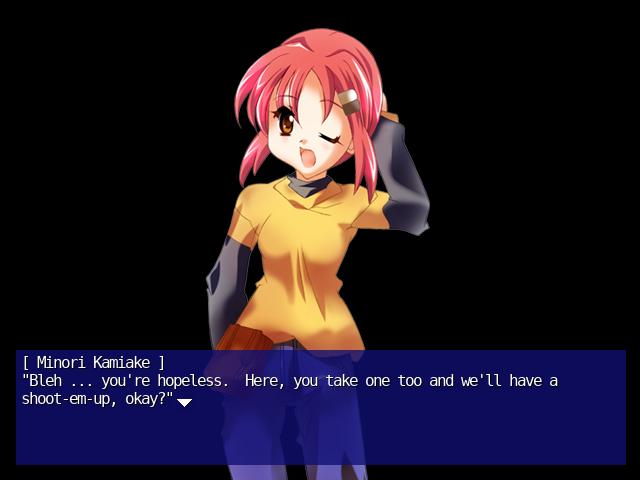
After the pair ran out of fireworks, they turned to sparklers. As their sparklers were dying out, Minori suddenly said to Haruki “… summer’s nice, don’tcha think?” Haruki agreed. He then said when Minori’s sparkler faded away:
I knew then that no matter how many years passed, I would never be able to forget the lonely smile on her face at that moment.
This is an interesting – not-entirely-explained observation. My best stab at it is that Minori felt a little wistful that a fun day was coming to a close.
We returned to comedy after Haruki took a shower at the campsite and Minori held out a note from her Grandfather which was attached to the one (wait one?) sleeping bag:
Now we’ll see if birds of a feather really DO flock together.
Grandfather Karose
Minori’s grandfather was playing his comedic role even after exiting the stage that morning (note: I have found that anime/manga/visual novel grandparents are either over-protective of their grandchildren or this). Here, we do learn a bit more about the early relationship with Haruki and Minori. Haruki immediately offered to yield the sleeping bag to Minori, but she rejected his offer on account of the weather. Haruki still did not expect Minori to suggest that they share the sleeping bag, but Minori noted it was big enough for both of them – thus giving the victory to her grandfather. For whatever it is worth, I do not think Minori planned this with her grandfather, but I suppose nothing is impossible. Haruki’s reaction to the single sleeping bag is consistent with the general lack of physical intimacy between the two – which does not, save for the sleeping bag incident, go beyond Haruki resting his head in Minori’s lap. Eventually, they awkwardly and shyly shared the sleeping bag – but the particulars of their awkward conversation are beyond our scope but largely consistent with their back and forth leading up to it. After they teased each other and exchanged some sappy lines, Minori fell asleep first. Haruki as narrator described his thoughts:
So my relationship with Minori could not cross that boundary, but still, I felt happy just being like this. We were past being strangers, but not yet arrived at being friends; we’d come straight to THIS point in a relationship. There was still plenty of time for us.
Haruki Mizoguchi
August 27
Minori woke up two hours before Haruki and worked on breakfast and making preparations for the final leg of their hike. Haruki apologized for sleeping in while she did all the work. Perhaps one year prior, Minori would have whacked him for sleeping while she was working. But here:
It turns out it’s pretty fun to make breakfast for someone else!
Minori Kamiake
Haruki and Minori continued their hike after breakfast – and Minori remained in extraordinary high spirits. Haruki as narrator mused:
I saw how happy she seemed. I’d gotten to know her expressions while I was around her at the temple, but maybe this happiness was closer to expressing the real Minori.
Haruki Mizoguchi
Perhaps part of the reason Minori wanted to share a special place to her with Haruki was so she could show Haruki what she was like in the place she felt most at peace.
By this stage, one could be forgiven for forgetting that the ostensible objective of Minori’s march was to show Haruki snow in August. We seemed not close to the goal when Minori stopped in front of a cave and announced that their destination was inside. Haruki was forced to leave his giant backpack outside the cave to follow Minori in.
They walked through the cave, and as they approached the exit, Haruki thought to “believed … with all my pounding heart” that Minori’s snow “was just beyond.” They emerged from the cave into a grassy field, a flat meadow, where there “was a gaping CRATER” that was “surrounded on all sides” by an “encircling wall” featuring “a ring of pure, complete whiteness, distinct from the rest of the sloping walls.” The whiteness was a mass of dandelions.
Haruki was in awe, noting to himself that the flowers did indeed look like snow. He said out loud:
Wow, Minori, this is fantastic. This really IS summer snow.
Haruki Mizoguchi
However, Minori cryptically said that it was not snow yet. More cryptically, she told Haruki that she had to make preparations and directed Haruki to wait in the middle of the meadow, because “not being in the middle is dangerous.” Haruki was sufficiently entranced by the scene to apparently not think too much about what Minori, who had been shooting fireworks at him mere hours earlier, had said.
I felt as if I’d somehow slipped into another world. All alone in this wide open space, I looked up at the sky as I awaited Minori’s return. Somewhere in my heart I felt a quiet, but very real, spark of happiness as I looked forward to whatever was coming.
Haruki Mizoguchi
(I assume you, fair reader, can figure out what Minori had planned.)
Minori returned with an electrical cord connected to “a faraway spot on the ‘walls’,” which Haruki, awe-struck as he was, had apparently not been expecting. Before taking action, Minori excitedly said:
At last I get to show it to you for the first time … are you ready for it? Open your eyes nice and wide, okay?
Minori Kamiake
It is notable Minori said for the first time, one of multiple references to the idea that she would return to this trail again and again with Haruki. Haruki was confused, but Minori made a promise:
Just wait – you’re going to see something you’ll remember for the rest of your life.
Minori Kamiake
Minori lit the fuse she was holding and, perhaps too late, advised Haruki to cover his ears as the sound of an explosion went off.
(Bad end?)
The explosion dislodged the dandelion puffs from the wall, throwing them into the air and leaving them to “flutter[] down in single, fine pieces.” Haruki as narrator stated:
The flakes rose toward the sky, and then the show began to fall. And from the summer sky, snow was falling.
Haruki Mizoguchi
Haruki was too surprised to respond when Minori asked him if it was pretty. As narrator he described his feelings:
All about me was calm. Peace. And all I felt was excitement, the great desire to jump all about in the white. The snow continued to fall without making a sound. For some time, I simply kept staring up at the sky, taking in the view. As I felt the sunshine washing over me, my gaze followed the trajectory of the snowflakes. ‘This is, without a doubt, the most incredible sight I have ever seen in my life.’
Haruki Mizoguchi
He did regret his lame “sure” in response to Minori asking if they could return next year. Haruki was more eloquent and verbose as narrator:
I knew that from here on out, in the years to come, I would recall it, over and over and over.
Haruki Mizoguchi
As they were exiting the tunnel, Minori explained in childish exuberance how the “snow” worked. She the noted its significant origin:
So, like, that place? It took Grandpa FIVE YEARS to create it for proposing to Grandma! He found these summer dandelions, and I guess he also found that he could lay tunnels to let the wind through … or something. And this is what always reminds me of summer!
Minori Kamiake
Perhaps Minori had the story of their final destination in mind when she was greatly flustered by Haruki’s joke the day before about her being a good future wife.
When they exited the cave, Haruki’s sense of wonder about Minori’s August Snow gave way to surprised exasperation on one point: He learned when he and Minori were greeted by Minori’s grandfather in a car that the location of the cave and August Snow was right near Minori’s grandparents’ house. It turned out that the entire hike was mostly unnecessary – Haruki had not realized, despite descending on the second day, that Minori had taken him in a circle. She just wanted to hike with him before the August Snow.
This is where our story ends – not before a final poem from Haruki as narrator. I will quote part of the poem:
The summer sky was far and blue
Now and ever ringing true
The tender rays of daylight’s star
Came shining strong from space afar
The two of us inside this train
Were gliding toward future’s refrain
And just ahead were days unchanged
Waiting for us to come once more
The same routine, nothing exchanged
But now for us what was in store?
Summer’s blue skies rose up on high
Spreading wide before my eyes
From the sun came dazzling light
Warm rays strong and shining bright
The season of snow falling was still far, far away.
“But now for us what was in store?” That will have to be left to the reader’s imagination, for May Sky ends in August.
Final August Snow Analysis
When I first read May Sky, I did not know what to expect from the August Snow chapter. For one, I did not expect August Snow at all. For two, I certainly did not expect for it to add at least an hour to May Sky’s reading time.
In both length and content, August Snow turned out to be much more substantive than I had expected. But for August Snow, Collage, not May Sky, would have been my top-ranked visual novel of al|together.
The first thing to appreciate about August Snow is that it goes against the grain of treating becoming a couple as the end of the story. May Sky could have easily ended with Haruki’s return or, if written slightly differently, Haruki’s accepted confession in the first May. But we would have had many unanswered questions. What would this relationship between the pair who went through the main story in some indeterminate space between friends and strangers look like? Especially given how young Minori is. The authors correctly decided to show readers how things were going a few months after Haruki’s return.
August Snow does well to naturally and subtly recreate certain scenarios from the previous year while showing us how the scenarios played out when Haruki and Minori are a couple. The central dynamic wad the same, but their interactions have changed for the better. Both Haruki and Minori have grown up a little. Haruki’s work-related angst is gone and he is happy taking things slowly with Minori and following her example in appreciating the little things around him. Minori is a year older – not at all insignificant when we are talking about the difference between 16 and 17 – and she is far more capable of being sincere and considering his perspective than she had been a year earlier.
Minori, having decided that Haruki is special to her, wanted to share some things that are special to her and core to understanding her with Haruki. Their adventure concluded with the August snow. In addition to being an explosively (literally) pretty show, it had special significance to Minori. It is a memory she shared with her grandfather, it is something she specifically associated with summer, and it has romantic significance in that her grandfather created the scene to propose to her grandmother. Haruki developed special feelings for Minori in the first place because she shared beautiful things with him – first her piano playing and second her poetic thoughts about May, the sky, and an appreciation of the seasons generally. Minori topped those earlier gifts by sharing with Haruki something she could only share when they were more than strangers and something more than friends. Haruki was even more taken by the beauty of this gesture than he had been by Minori’s piano and earlier speeches, describing it unequivocally as “the most incredible sight I have ever seen in my life.”
With all that being said – while May Sky has a positive and optimistic ending, it does not have a happily ever after ending. Minori noted in August Snow that she had yet to have tell her mother about her new 23-year old boyfriend. Haruki, in one of his monologues, referenced the fact that he and Minori, who had only spent about four months together total (add in the fact that they did not have a conversation for an entire intervening year), had skipped many steps en route to their relationship. They still had much to learn about each other. The reader is also left with many questions about the pair. For example, Minori will presumably graduate high school eight months after August Snow. What are her plans for college, or for a career? We have no idea – those matters are beyond the scope of the simple story. Also notable – none of Haruki’s narration references a certain future with Minori. He assures us he will remember specific events. Both he and Minori appear to be planning to be together for the long haul, but one can imagine many different ways a relationship between two people who are improving themselves, but still have many latent flaws, will ultimately progress.
August Snow has the effect of inviting the readerto root for the newly-minted salary man and piano-playing part-time shrine maiden to find happiness together.
Final May Sky Analysis
What precisely was May Sky about? There is no one better to ask than the lead translator herself, Irene Ying. I quote from her essay on the official project website:
May Sky is a story of isolation from the start. We begin with our narrator, so deeply sunken into himself that he has no friends and can barely go on in life. Then we meet an outrageously unsympathetic shrine maiden. These are are practically the only voices we encounter. Throughout the story, other people wander in and out, but even those who try — i.e. Mizoguchi’s nameless ex-colleague — are unable to influence Mizoguchi’s life at all. And Minori, who declared quite loudly that other people can go to hell for all she cares, is the one who is able to teach Mizoguchi to take control and responsibility for his life. Similarly, Minori’s classmates and friends criticize her behavior, but she intentionally ignores them; it’s only Mizoguchi who is able to finally make her speak the truth at all.
Irene Ying
I largely agree with Ms. Ying’s take, albeit with a qualification on the “Minori … teach” point and placing more emphasis on why Haruki was attracted to Minori. Note that it is entirely possible Ms. Ying, who necessarily read the original Japanese script many times in deciding how to convey it to English, is more over the target – so take my differing focus as you will.
I offer my own one-sentence summary:
The story of how an angsty new office worker and nature-loving temperamental teenage shrine maiden, both of whom are lonely and somewhat selfish, create a world just for the two of them and grow up just a little bit in the process.
Haruki and Minori often behave in ways that make them unsympathetic, and May Sky is, at its heart, the story of a strange relationship between two disordered people. The loneliness that drew them together was caused in part by how they interacted with the people around them.
I made a point throughout my analysis of highlighting the ages of Haruki and Minori, and not only for the obvious reason that Haruki’s initial confession of love to a 16-year old high school student was at least a little bit head-tilt-inducing.
A significant reason that May Sky works to the extent it does is because Minori is written credibly for a teenage girl. She is a mercurial bundle of contradictions. Minori is simultaneously intelligent and immature, thoughtful and careless. She loves the world around her but is remarkably self-centered when it comes to dealing with others. The same girl who in one moment eloquently describes her love of May in the next attacks a man she had just met with a broom. She proudly claims that she does not care about anyone around her and then gets angry when she feels that she is being ignored. She has a very teenage tendency to intellectualize sentiments instead of stating clearly what she thinks and feels to the point of creating easily avoidable misunderstandings. Minori wants others to see her how she wants to be seen but makes little-to-no-effort to understand others. She is notably childish in how she seeks attention by seeing how much she can get away with. Minori’s comic violence toward Haruki can be seen as an awkward way to get closer to him while maintaining dubiously plausible deniability. Part of why she becomes attached to Haruki is because he indulges her even when she indulges her own lesser tendencies.
But we see Minori mature throughout the story. I will submit that she was probably not ready for any romantic relationship, age aside, when Haruki confessed his love on May 29, 2005. While their ensuing year apart was painful, it did both Haruki and Minori some good. We see evidence that during that year Minori begins making an effort to be part of the world around her by becoming closer to her friends, and she begins to think honestly about why she does what she does, even if it does not necessarily change her actions. Minori seems more mellow in August Snow than she did as a 16-year old 15 months earlier. While some of that is undoubtedly owed to the fact that she no longer doubts that Haruki is paying attention to her, I do not think Minori would have been capable of thinking of another person in May 2005 in the manner she does in August 2006.
Haruki addresses his own immaturity head-on in many of his monologues, although that does not necessarily mean he acts on it. He begins the story struggling with taking his first step into the adult world in a town he does not know without the support system and structure he had as a student. He showed the quintessential depressive tendency of taking what he felt at a particular moment (dread at doing a job he found meaningless) and assuming that this feeling would extend indefinitely. Minori’s piano-playing and her imploring him to open his eyes and appreciate the world around him genuinely touched a young man who was trapped in his own head (it is perhaps ironic that the self-centered Minori inspired Haruki to get over himself ). Had Haruki not been as lonely as he was, I suspect he would not have fallen for a 16-year old shrine maiden, but as he stated as narrator, Minori’s attention and aesthetic sensibilities were like a lifeline to him. In a less abstract take, I suspect that Haruki, who was, in his mind, staring down the barrel of spending the rest of his life chained to a desk, was attracted to a younger lady whose world was smaller but whose eyes saw possibilities that he had become blind to.
While Haruki, like Minori, struggled with their one-year separation, their year apart did him some good too. The only way that a relationship between the young salaryman and the younger-still high school student could work was if Haruki, being the older one, was mature enough to make it work. Haruki becomes more responsible in his year apart from Minori, learning to make the most of his job while appreciating the sky and seasons as he had learned to do from the girl he fell for. Haruki uses the prospect of fulfilling his promise to Minori to succeed in his work, and he returns ready to indulge his girlfriend in healthier ways than he had in the May of their meeting.
This segues into the one point I may disagree with Ms. Ying on, depending on what she meant. I do not think, strictly speaking, that Minori taught Haruki how to take responsibility for his life, at least not intentionally so. I would disagree if this assertion pertains to their fight on May 15 when Minori lectured Haruki for seeking her counsel. I do not think Haruki learned anything from that and, for whatever it is worth, I think the view of the author is that Minori was right about Haruki’s behavior but wrong in her broader worldview. Minori did, however, give Haruki the tools to survive their year apart by teaching him that there are beautiful things in the world around him if he would only recognize them, Ultimately, Haruki did use the prospect of returning to Minori, both for his own sake and to fulfill his promise to return to her, to motivate him to tackle his job with enthusiasm. These factors surely contributed to Haruki earning the reassignment he sought to the place he had hated before meeting Minori there.
Similarly, Haruki inelegantly forced Minori to be genuinely sincere. While Minori was more open with Haruki than she was with her friends and family (by her own account, at least), her initial attempts at openness were clouded by her inherent defensiveness. She was open with Haruki about her harsh worldview on helping others on May 15, but her worldview was flawed. She confided in him on May 21st and expressed why she felt more comfortable with him than with her family or friends, but she did so in a convoluted, and seemingly hurtful characteristically Minori way which had the effect of almost ending their relationship. It was only when Haruki maladroitly backed her into a corner on May 29 with his declaration of love did she muster the courage to be open and honest about what she wanted instead of trying to hide her feelings in psuedo-intellectualism. Had Minori not been able to say that she wanted Haruki to return, their story together would have ended in May 2005.
Minori, like Haruki, is a difficult character for much of May Sky, but she, like him, proves to be more easily likable when we spend time with her in August than she was in the early parts of the story.
I agree entirely with the conclusion to Ms. Ying’s analysis:
Somehow, inexplicably, beautifully, they are able to make this simple and pure connection. And still, they are able to join a ‘group’ of acceptance, belonging, and hilarious fun (and bad karaoke). After that we see that they come to accept their selves and circles for what they are: Mizoguchi learns to live with and even enjoy his job. And Minori … well, her friends push her into an incident with some chicken …
Irene Ying
Haruki and Minori are better and happier people at the end of August Snow than when we meet them in May of the previous year. While it is entirely possible that Haruki would have worked through his freshman blues to some extent had he not met Minori, and Minori may have tempered some of her anti-social tendencies without meeting Haruki, the clear position of the script is that Haruki and Minori were, in the final assessment, mutually good influences, often in spite of themselves. Ms. Ying’s describing this as occurring inexplicably is on the mark. Things worked out well – somehow.
I conclude with my personal pet theme take on May Sky. While Minori is indeed a strange, temperamental, teenager, there is, as Haruki put it, something incredible in her, or to put it in words more fitting for someone who was not falling for her, a pretty aesthetic sensibility. Minori never quite felt like she fit in the town she lived after having moved from the countryside, but she never lost sight of the things she loved from the country. She took time to appreciate the special characteristics of the seasons and different times of day and note the leafing trees and blooming flowers. Minori expressed her love of nature through the piano. We see how Haruki benefits as a person from considering Minori’s arguments for taking a deep breath and appreciating the amazing things all around him. May Sky, through the character of Minori Kamiake, encourages its readers to take a moment to go outside, take a walk, and appreciate the world, and to carry those aesthetic sentiments wherever they go, just as Haruki did when he moved for a year on account of his job. While nature may not be enough to fully make whole a lonely heart, the experience of Minori and Haruki show that a proper appreciation of the seasons can make one freshly attuned to the winds of new beginnings.
This article is part of my collection of posts about May Sky, Insani's 2008 localization of a freeware Japanese visual novel called Gogatsu no Sora.
